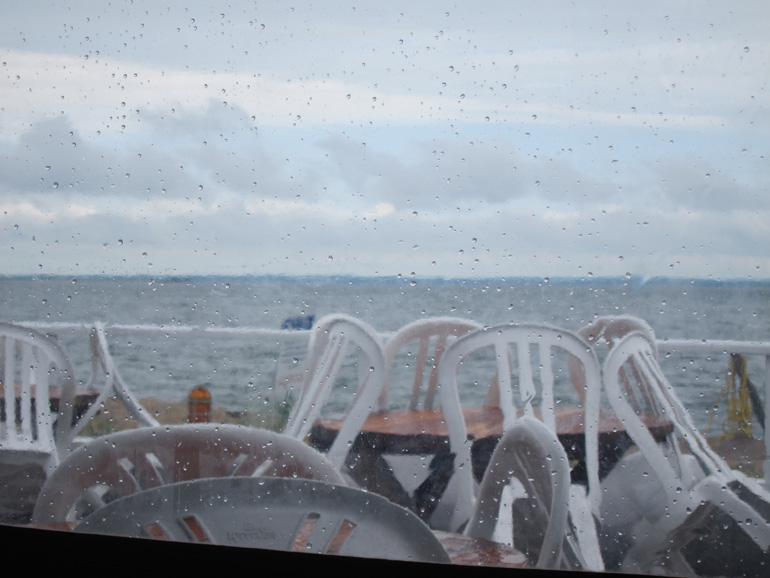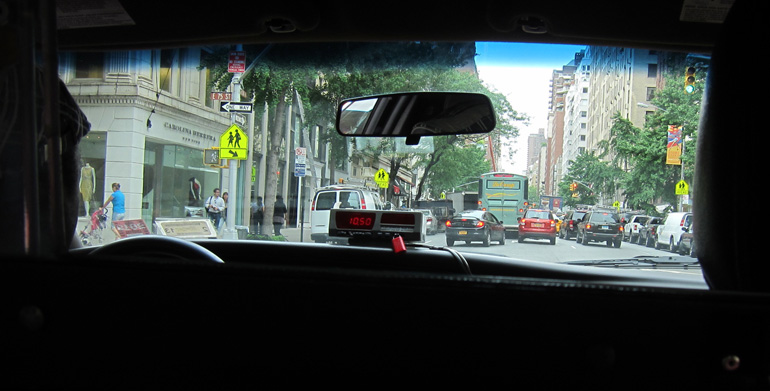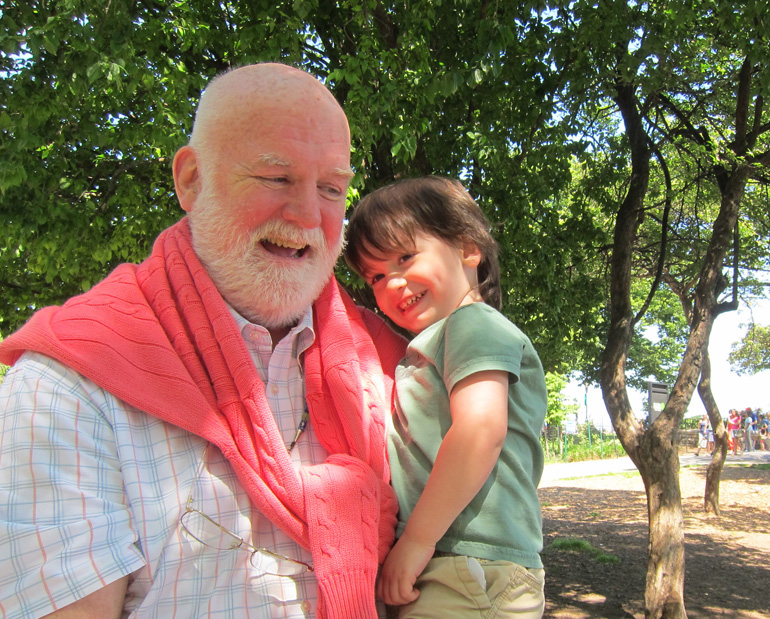August Weekend:
Guillaume le Conquérant
18-19 August 2012
Saturday, August 18th, 2012
Here will we sit, and let the sounds of music creep in our ears. Soft stillness and the night become the touches of sweet harmony.
We’re here, and, amazingly, at 10:15, we’re all still awake. There has been a diaper emergency. Ryan has sped off to the town to see what can be bought. Meanwhile, Will is, incredibly, operational. And so am I, even more incredibly, given the little list of Things That I Forgot, the only significant lapse being the cable that connects the camera to the computer — a lapse that Ryan redressed with magic from his own backpack.
Kathleen is reading Green Eggs and Ham to Will while Megan has a moment of regroupment. We are all incredibly content. Ryan agreed with me: it’s as though the time between now and our last time here had been shoved into a closet. Not forgotten, but so not real.
There’s a loft, over the bedroom where Megan and Ryan will stay (a bed with a tester!). Will has decided that the loft is “his house.” His parents are wonderfully game.
***
I did have an amazing day: everything went as it ought. Once we were established in the house, I set out for food and booze, and decided to separate the missions. So I went out for booze, and then I went out for food. My head was an airport. It will take a day or two to settle down into the mode of being still, not traveling. Â
Meanwhile, Will, who will be here for a week, is having the highest of holidays. All of us are convinced that he is the one important person in the room.
***
If Saturday was the day of arrival, Sunday has been the day of settling in — cooking, dishwashing, and laundry. All pursued with such enthusiasm that my cell phone got laundered along with the towels. My fault exlusively. I realized what I’d done shortly after the point of no return. I’ve resolved myself to a few days without a phone. I haven’t had a fit. But I’m shaken and disturbed.
The governing idea of a month by the sea — and, by the way, we have yet to walk down the lane to the ocean — is simplicity, the toughest of all standards for anyone not obliged by need and lack of options to observe it. If deprivation is a human condition characterized by preoccupation with the things that are lacked, where does simplicity shift from boon to burden?Â
My brain is still an airport, and at the same time a plane seeking to land. s
***
This morning (Sunday), I finished a dandy little book by Malcolm Balen, A Very English Deceit. It’s a brisk account of the South Sea Bubble that exploded in England in 1720, later in the same year that a similar plutomania blew up in France. (Confusingly, the Banque de France and the Mississippi Company, headquartered in Paris’s rue Quincampoix, were the brainchildren of Scotsman John Law, a fugitive from English justice after the death of a romantic rival in an impetuous duel. Law did not return to England until the 1740s, after the fall of Walpole, when he was able to purchase a pardon for £10,000. Just to keep one’s head spinning, Law is buried at San Moisè, in Venice.) The episode takes its name from the South Sea Company, set up in 1711, by Tory leader Robert Harley, as a trading operation that would challenge the domination of existing Whig institutions, the Bank of England and the East India Company. Nine years later, and now just as Whig as they, the South Sea Company stepped forward with an ingenious scheme for eliminating the staggering national debt. Balen explains this scheme lucidly, and he also explains how something so hare-brained ever attained Parliamentary imprimatur. In other words, he tells a tale for our times, of corrrupt government toleration, and even encouragement, of fraudulent finance.
Edward Pearce’s book about the Walpole ministry made me realize that I had to find a book that focused on the South Sea Bubble itself, in order to organize the litter of information deposited by histories to which the catastrophe was incidental. (Charles Mackay’s well-known 1841 retelling is long on drama but short on mechanics.) Subtitled “The South Sea Bubble and the World’s First Great Financial Scandal,” Balen’s book was occasioned, as it were, by the dotcom bust of 2001. The author, a journalist with sometime berths at ITV and the BBC, acknowledges his debt to John Carswell’s 1993 study of the Bubble, which he clearly has no intention of superseding. A Very English Deceit is not really history; it’s reportage of the highest Vanity Fair quality. Which is precisely what one wants in a case like this. As an accounting of the actions and intentions of individual men — real history — Balen’s book is arguably second-rate. Having read a number of books, just in the past year, about English politics in the first half of the Eighteenth Century, I must say that I find Balen’s characterizations of the leading players, from George I to Robert Knight (and, when you know who Robert Knight was, you know what the scandal was all about), are either crude or cursory. Balen’s ball, however, is not the individual players but the game itself, and Balen shines as a financial sportscaster. The following passage, depicting the very crest-into-crash of the wave, gives a good idea of Balen’s comfortably engaging style.
Despite the gullibility of the investors and the apparent success of the share launch, however, Blunt was facing a severe cash-flow problem. Without an even faster inflow of money, there simply wasn’t enough cash … to support the share price, and if the share price could not be supported then the illusion he had created for the last six months would be shattered. Accordingly, he found a way of demonstrating his supposed confidence in the Company’s future. On 30 August he persuaded the Court of Directors to vote for an absurdly generous Christmas dividend of 30 per cent, accompanied by the astonishing promise that the annual dividend for a decade would be 50 per cent. The offer of such an extraordinary dividend was an attempt, though far too late in the day, to persuade investors to keep their money in the Comapny for the long term, rather than indulging in the short-termism that had marked the attitude of shareholders in the other bubbles. But to be in a position to pay such amounts, its shareholders could calculate, the Company would have to make at least a £15 million profit each year.
The effect was not as Blunt had intended. It was as if someone had thrown a bucketful of cold water over the investors, who had so blindly followed his charismatic financial leadership. They stood blinking and disbelieving at what they saw before them: a company whose trading prospects had been nonexistent in the past, and would be nonexistent in the future; a company whose proposed dividend implied such extraordinary annual profits that anyone with any sense could now see that it simply could not trade on the multimillion-pound scale which the offer to shareholders suggested; a commpany which was, quite nakedly, a machine for making a profit out of debt reclamation, and not a trading company at all; a company which still had a third of the national debt to sell, and whose chances of doing so were receding by the hour. “Sir,” wrote a sceptical correspondent to one newspaper, “South Sea is very sick, a premium of 50 per cent has been applied as a cordial for revival, but it won’t do; the old woman droops still.”
More intriguing, for me, than the familiar ride of boom and bust is the wonder of Walpole’s cunning transmutation of national disaster into the longest, as well as the first, premiership in British history. Walpole stage-managed the short-term resolution of the shock in such a way that the power structure that he intended to control was not itself damaged; this meant shielding a number of Very Important People, not exluding His Britannic Majesty. It meant making sure that the British government’s official call for the extradition of Robert Knight was diplomatically flouted by officials of the Holy Roman Empire; as keeper of the “little green book,” Knight was like the accountant who exposed Al Capone as a tax cheat, only, in this case, with the government in the gangster’s seat. Walpole decided which malefactors got to walk and which were pilloried and subjected to clawback. (One South Sea functionary was left with only £31, which seems a bit heartless.) And the irony of it was that Walpole’s position as Mr Clean owed entirely to his personal banker’s sensible refusal to follow Walpole’s instructions to pour money into South Sea at the peak. It is difficult to think of other opportunists on the scale of Sir Robert Walpole. Even Balen, who regards almost everyone in his book as some kind of knave (Earl Stanhope excepted), cannot avoid sounding impressed. “Walpole had protected King and country, preserved the Whig hegemony, and had made himself the indissoluble element that bound all three together.” You can’t think of studying politics without him. Â




